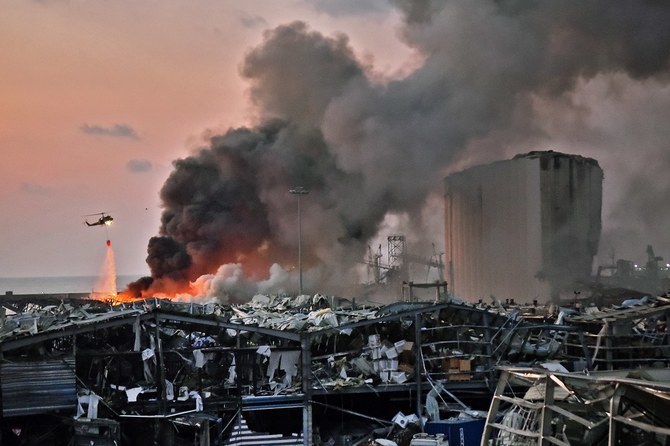BEIRUT: Two former Lebanese ministers, Ghazi Zaiter and Ali Hassan Khalil, have refused to appear before Lebanon’s judicial investigator as part of criminal proceedings following the Beirut explosion.
Judge Fadi Sawan charged the ex-ministers, Prime Minister Hassan Diab and former minister Youssef Fenianos last week with “criminal negligence causing the death and injury of hundreds of people.”
The two former ministers justified their decision by saying that they “did not receive a formal summons.”
The pair also submitted a request to remove Sawan from the case because of “legitimate suspicions” regarding his neutrality.
A judicial source told Arab News that the revelation means “Sawan should stop the investigation with Zaiter and Hassan Khalil until the Court of Cassation decides on the recusal request after he delivers his remarks.”
Sawan said that he “did not intend” to step down and will continue investigating the file, setting Jan. 4 next year as the new date for the two former ministers to appear for questioning.
Lebanon’s investigation into the port explosion has faced political objections. Many have called for ministers and MPs linked to the disaster to stand before the Supreme Council.
The 1989 Taif agreement established the Supreme Council in Lebanon as a formal body to charge and convict presidents and ministers.
The Supreme Council consists of 7 MPs elected by parliament and 8 judges of the highest rank. Supreme Council procedures are only initiated if a two-thirds majority is reached in Lebanon’s parliament.
However, Col. Bechara El-Khoury, head of the Ministry of Defense legal department, said legal texts have “created ambiguity in drawing the boundary between ordinary crimes and violations resulting from breaching the duties incurred by the prime minister and ministers.”
He added: “The jurisprudence has not resolved the difference in views.”
A source in Lebanon’s judiciary said: “Parliamentary immunity is waived from Zaiter and Hassan Khalil when they are accused of murder.
“This is a criminal offense and is within the jurisdiction of the judicial branch, because their breach of duty resulted in murders.”
On Wednesday, Deputy Parliament Speaker Elie Ferzli criticized Sawan in parliament. “The background to Sawan’s accusation against the prime minister and three ministers is political,” he said.
“What has the principle of separation of powers become? We did not find any serious or nonserious suspicion involving all those whose names were mentioned in the letter that Sawan sent to parliament,” he added.
On Wednesday, Sawan listened to the testimony of former Lebanese Army Chief of Staff Maj. Gen. Walid Salman. A judicial source said: “Maj. Gen. Salman is a witness until now, waiting to see and study his testimony.”
Sawan previously charged the Beirut Port Administration and Investment Authority with negligence, possible intent to murder and attempted murder. Hassan Quraitem, the port’s director, was arrested about four months ago.
Director-General of State Security Maj. Gen. Tony Saliba also announced his refusal to appear before Sawan in a session scheduled for Thursday, asking to be invited through the Supreme Council of Defense.
Sawan is expected to question caretaker Prime Minister Hassan Diab on Friday.
Future bloc MP Mohammed Al-Hajjar questioned the Lebanese president’s responsibility for the disaster.
He said: “The president of the republic knew about the ammonium nitrate 15 days before the explosion. He knew more than others the danger of these materials near neighborhoods, and he is a former commander of the army and the head of the Supreme Council of Defense. So who is responsible?”
Meanwhile, Lebanon’s General Labor Union suspended a general strike on Wednesday that was set to protest against the removal of subsidies on basic materials.
Union head Bechara Al-Asmar said: “The union reached an understanding with Prime Minister Hassan Diab and the ministers concerned about not removing the subsidy on wheat, and it was confirmed that medicines for chronic diseases and diesel will still be subsidized.
“There is a keenness to postpone the move because it coincides with the holiday season and the need to move commercial markets, which are on the verge of bankruptcy."”
A delegation from the union visited President Michel Aoun, who said: “The crisis in which the Lebanese are facing is one of the biggest crises, and we are working so that the economic and financial measures that we are taking are consistent with the situation in which we live.
“The big problem that Lebanon suffers from lies in securing the money needed to put solutions into practice.
“The money in the treasury is very limited and we are working to secure it. We are the ones working on that and we are not the ones who spent this money,” he added.
Aoun warned that “rumors are spreading and have caused great damage in terms of building confidence between the Lebanese people and the judiciary, which I renew my absolute support for in the face of pressures.”


























